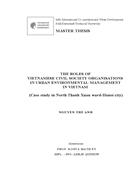




Mã tài liệu: 28022
Số trang: 103
Định dạng: docx
Dung lượng file: 5,985 Kb
Chuyên mục: Tiếng anh thương mại
At the present, international agencies in term of urban management have a significant trend to impulse public participation and enhance the roles of civil society organisations. This trend has been concretized at the Rio de Janeiro conferences in 1992. In this conferences report, the United Nations emphasized to public partipation at local level and the decentralisation of power between the state and local authorities as well as interactive relationship between local authorities, the private sector and the CBOs (Community – based organisations). They proposed the principles based on the assumption that, at the local level, exist organized civil society and these organisations have enough capacities to run independently and cooperate to local governments. From there, it appeared significant waves to support the empowerment of local actors by many international programmes. Apart from positive sides, there are another sides, mainly from Western scholars and researchers, were not recognized the existence of ‘real’ civil society in Communist countries such as Vietnam and claimed to replacement of local organisations by ‘real’ Western – flavoured . They seemed to assess the context in Vietnam by Western concepts without considerations for local culture, socio – political conditions as well as religious. As we known, in Western countries, due to a long time of development and verifying, the roles of civil society in urban management process are clearly by means of NGOs, CBOs. These organisations are created and operated based on the norms and the methods which are recognized broadly in Western countries. Meanwhile, developing countries have different culture, political regulation, economical condition… and democracy and civil society are actually sensitive issues. For this reason, in developing countries, civil society is acknowledged in different way so that the forms and the roles of civil society organisations in development process in general, in urban management process in particular are also different than same organisations in Western. Sometimes these organisations are even recognised as threats for power of the state and it is very complicated to approach information and examine them. Hence, for a long time, Western always has doubts about the transparency and the independence of civil society organisations from the state in developing countries. That is great argument for all times and finding the totally exact answer for that seems to be a utopian thing at least until now. In Vietnam, under the Socialist regime, “the term ‘civil society’ has a negative connotation and until recently was considered a ‘sensitive’ term, which is to say that it could not be discussed very openly. A major reason for this sensitivity was the role that civil society played at the end of the 1980s in the transitions in Eastern Europe” . Prior to 1990, until Vietnam gradually changed from the centrally planned economy to the socialist - oriented market economy, there were only few researchers tried to learn about Vietnamese civil society organisations and strive after finding a possible answer for that important issue but results that they attained were very limited. Recently, information about operation of Vietnamese civil society organisations is opened more and more, research works about Vietnam civil society are appearing progressively and contributing actively to the development of Vietnam civil society. Nothing more than this purpose, with the expectation to contribute a tiny effort to the urban management as well as the social development process in Vietnam, this thesis try to assess the role played by Vietnamese civil society organisations in real urban environmental management situations and point out their limitations, their potentialities of development in future through the case study in North Thanh Xuan ward in Hanoi. This project is one of pilot projects of the urban environmental rehabilitation programme are funded by DANIDA, by government ministries and from local development funds. From there, we can also learn about the differences between ‘real’ NGOs, CBOs in the West and Vietnamese civil society organisations as well as the appropriate concepts that can be adapted to status of civil society in Vietnam.
Những tài liệu gần giống với tài liệu bạn đang xem
📎 Số trang: 13
👁 Lượt xem: 2163
⬇ Lượt tải: 32
📎 Số trang: 57
👁 Lượt xem: 507
⬇ Lượt tải: 16
📎 Số trang: 45
👁 Lượt xem: 588
⬇ Lượt tải: 16
📎 Số trang: 76
👁 Lượt xem: 1404
⬇ Lượt tải: 19
📎 Số trang: 75
👁 Lượt xem: 553
⬇ Lượt tải: 18
📎 Số trang: 66
👁 Lượt xem: 705
⬇ Lượt tải: 16
📎 Số trang: 58
👁 Lượt xem: 1344
⬇ Lượt tải: 18
📎 Số trang: 57
👁 Lượt xem: 479
⬇ Lượt tải: 16
📎 Số trang: 38
👁 Lượt xem: 637
⬇ Lượt tải: 16
📎 Số trang: 30
👁 Lượt xem: 1225
⬇ Lượt tải: 16
Những tài liệu bạn đã xem
📎 Số trang: 103
👁 Lượt xem: 796
⬇ Lượt tải: 16
📎 Số trang: 273
👁 Lượt xem: 971
⬇ Lượt tải: 17
📎 Số trang: 50
👁 Lượt xem: 300
⬇ Lượt tải: 16
📎 Số trang: 96
👁 Lượt xem: 280
⬇ Lượt tải: 10
📎 Số trang: 147
👁 Lượt xem: 738
⬇ Lượt tải: 16
 The roles of vietnamese civil society organisations in urban environmental management in vietnam
At the present, international agencies in term of urban management have a significant trend to impulse public participation and enhance the roles of civil society organisations. This trend has been concretized at the Rio de Janeiro conferences in
docx Đăng bởi
thuythinh2010
The roles of vietnamese civil society organisations in urban environmental management in vietnam
At the present, international agencies in term of urban management have a significant trend to impulse public participation and enhance the roles of civil society organisations. This trend has been concretized at the Rio de Janeiro conferences in
docx Đăng bởi
thuythinh2010